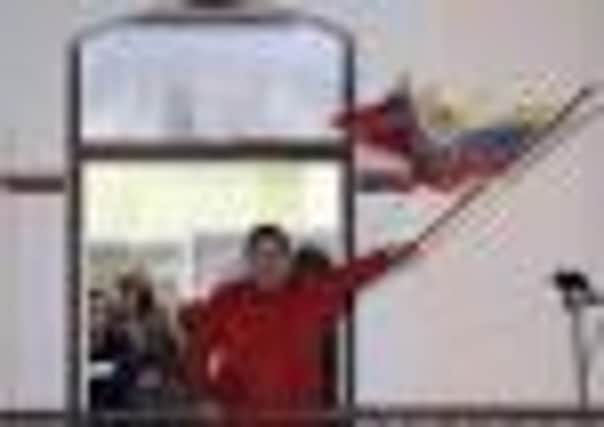Fresh nationalisations could be on the horizon as Hugo Chavez wins Venezuelan election


Tens of thousands of ecstatic supporters thronged the streets around the presidential palace, pumping fists in the air after the former soldier beat opposition candidate Henrique Capriles by nine percentage points.
The new six-year term allows Mr Chavez to consolidate his control over Venezuela’s economy, possibly by extending a wave of nationalisations, and continue his support for left-wing allies in Latin America and around the world.
Advertisement
Hide AdAdvertisement
Hide Ad“This has been the perfect battle, a democratic battle,” Mr Chavez said in a victory speech from the palace balcony late on Sunday, holding up a replica of the sword of independence hero Simon Bolivar. “Venezuela will continue along the path of democratic and Bolivarian socialism of the 21st century.”
It was an extraordinary victory for a leader who just a few months ago was struggling to recover from cancer.
He won 54.4 per cent of the vote in Sunday’s polls, against 45 per cent for Mr Capriles. Turnout was a record 80 per cent of registered voters, boosting Mr Chavez’s democratic credentials despite critics’ depiction of him as a dictator.
Supporters in the street in front of the palace danced and drank rum, and strained to catch a glimpse of Mr Chavez. “Chavez, the people are with you!” they chanted.
However, the victory was considerably slimmer than his win in 2006 – by 25 percentage points – reflecting growing frustration at his failure to fix problems such as violent crime, energy blackouts and corruption.
In a nod to those complaints, Mr Chavez said: “Today we start a new cycle of government, in which we must respond with greater efficacy and efficiency to the needs of our people. I promise you I’ll be a better president.”
A retired lieutenant-colonel who first won fame with a failed 1992 coup, Mr Chavez has become Latin America’s main anti-US agitator, criticising Washington while getting close to its adversaries, including Cuba, Syria and Iran.
A decade-long oil boom has given him tens of billions of dollars for social investments that range from free health clinics to new apartment complexes, helping him build a strong following among the poor.
Advertisement
Hide AdAdvertisement
Hide AdMr Chavez could order new nationalisations in some largely untouched corners of the economy, including banking, food and health. But any recurrence of the pelvic cancer which has already forced him to undergo three operations in Havana since June 2011 could derail his plans.
Opposition leaders were crushed by the loss after nearly a month of euphoria among Capriles supporters as the 40-year-old polished his stump speeches, held increasingly fervent rallies and appeared to be gaining ground in the polls.
“We are all hurt and sad but not disappointed. It was an incredible campaign,” said Teresa Perez, 51, a housewife. “Now
I don’t know what’s going to happen with Chavez in power for six more years.”
The youthful state governor put on a brave face, saying:
“I gave it my all and I’m proud of what we built … I will continue to work for Venezuela.”
Though Mr Capriles was by far the strongest candidate to face Mr Chavez since the left-wing leader was elected in 1998, few in the opposition thought the fight was fair.
Mr Chavez made ample use of state television and spent 47 hours in “chain” broadcasts that forced other local television stations to carry speeches peppered with political commentary.
He also handed out houses and pensions financed with state funds, often in ceremonies that glorified his administration, while warning that the opposition would cancel such programmes.